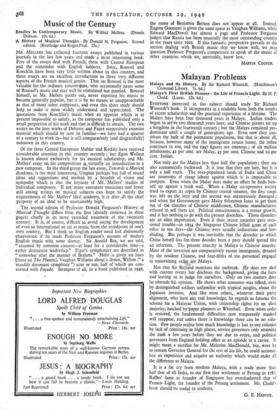Malayan Problems
Malaya's First British Pioneer : the Life of Francis Light. By H. P.
EVERYONE interested in the subject should study Sir Richard Winstedes book. It incorporates in a readable form both the results of recent scholarship and the practical experience of a lifetime. The Malays have been fottr thousand years in Malaya. Indian traders began to arrive two thousand years later, and Chinese pirates set up a kingdom in the fourteenth century ; but the Malays remained pre- dominant until a couple of generations ago. Even now they con- stitute the bulk of the permanent population, but that is about all, because, however many of the immigrants return home, the influx continues to rise, and the 1947 figures are ominous • of six million inhabitants, 41 per cent. are Malay, 45 per cent. Chinese and so per cent. Indian.
Not only are the Malays less than half the population; they are also economically backward. It is true that they are lazy, but it is only a half truth. The over-populated lands of India and China are reservoirs of cheap labour against which it is impossible to compete. Even when the Malay does make an effort he finds him- self up against a brick wall. When a Malay co-operative society tried to export its cobra by Chinese coastal steamer, the first cargo was left- on the jetty and the second was mysteriously damaged ; and when the Government gave Malay fishermen loans to get them out of the clutches of Chinese middlemen, Chinese manufacturers refused to sell them ice. Political consciousness is a recent growth, and it has nothing to do with the present disorders. Those disorders are an alien importation. Even if their secret societies gave occa- sional trouble—in 1854 the Singapore Chinese -killed 4,000 of each other in ten days—the Chinese were usually industrious and law- abiding. But perhaps it was inevitable that the disorder to which China herself has for three decades been a prey should spread like an infection. The present anarchy in Malaya is Chinese anarchy. Most of the terrorists are comparatively recent immigrants, dreaded by the resident Chinese, and four-fifths of- the personnel engaged in maintaining orrl% are Malays.
Not that Sir Richard mentions the outbreak. He does not deal with current events but discloses the background, giving the facts and leaving us to judge for ourselves. Only on two matters does he obtrude his opinion. He shows what nonsense was talked, even by distinguished soldiers unfamiliar with tropical jungles, about the Japanese invasion. And like most , others, whatever their party alignment, who have any real knowledge, he regards as fatuous the scheme for a Malayan Union, with citizenship rights for an alien majority, hatched bytaper planners in Whitehall. Even when order is restored, the frindamental difficulties now temporarily masked will reappear, and unless there is knowledge there can be no solu- tion. Few people realise how much knowledge is lost to-our colonies by lack of continuity, in high places, service governors only attaining the rank a few years before they are due to retire, and political governors from England holding office as an episode in a career. It might mean a sacrifice for ,Mr. Malcolm MacDonald, but, were he to remain Governor General for the rest of his life, he could accumu- late an experience and acquire an authority which would make all the difference to Malaya.
It is a far cry from modern Malaya, with a trade more than half that of all India, -to our first tiny settlement at Penang in 1786. Raffles' fame as founder of Singapore has overshadowed that of Francis Light, the founder of the Penang settlement. Mr. Clodd's book should be useful to students.
G. E. HARVEY.


































 Previous page
Previous page